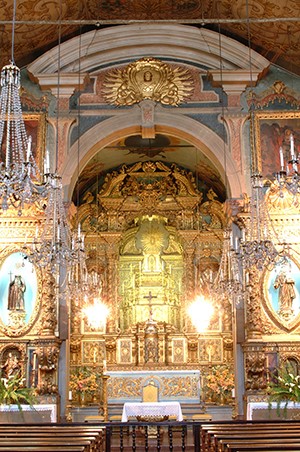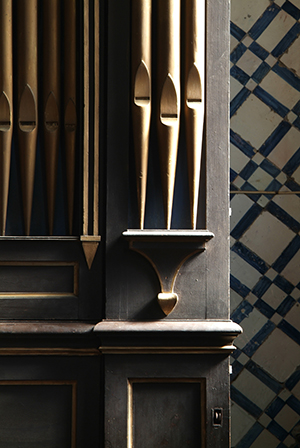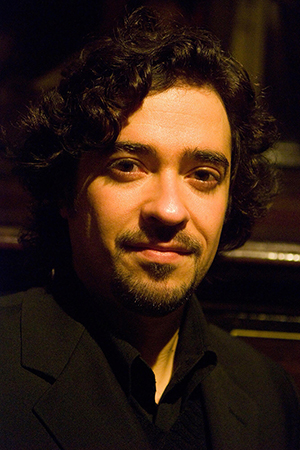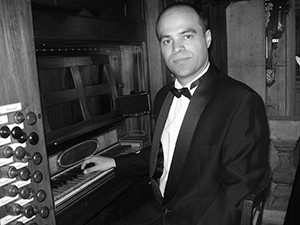 Sunday, 23 October, 6.00 p.m.,
Sunday, 23 October, 6.00 p.m.,
Igreja de Nossa Senhora de Guadalupe (Porto da Cruz)
Monday, 24 October, 9.30, p.m.,
Igreja de São Pedro (Funchal)
Rheinberger: Sacred Songs
Armando Possante, baritone
António Esteireiro, organ
Rheinberger: Sacred Songs
Joseph Rheinberger and Max Reger deeply influenced the renaissance of organ music in the South of Germany. Though their musical languages were quite different, both had, in Johann Sebastian Bach (1685-1750), their greatest musical point of reference, and they produced a substantial quantity of music for organ. Today almost unknown to most music lovers, Joseph Rheinberger was quite a well-known composer and teacher at the end of the 19th century. The prestige of this composer born in the Principality of Leichtenstein went far beyond the borders of Germany – he lived in Munich for four decades – even earning the admiration of the eminent French organist and teacher Alexandre Guilmant (1837-1911). The irreverent Max Reger also greatly admired Rheinberger, and dedicated to him the Fantasy and Fugue on B-A-C-H, op. 46 for organ, a very daring work for 1900. Appointed successor to Rheinberger at the Munich Academy of Music, Reger nevertheless did not manage to impose the modernity of his music there, leaving after only one year for Leipzig. Rheinberger’s sacred songs were originally written for voice and organ, though transcriptions and adaptations for organ solo were very common and much appreciated. Amongst the remarkable number of transcriptions and adaptations made by Reger, there are also various works by Johann Sebastian Bach and songs by Hugo Wolf to poems by Eduard Mörike (1804-1875). Sigfrid Karg-Elert was a contemporary of Max Reger in Leipzig, where he also studied and taught, leaving works for piano, organ and his favourite instrument, the Kunstharmonium, a concert harmonium of whose vast timbral and dynamic possibilities Karg-Elert made remarkable use. His harmonic language, closer to Debussy, Ravel and certain North American composers, contributed to his great prestige outside Germany, especially in the United States and England.
Less well known today than during his lifetime, Josef Renner the younger was organist of Regensburg Cathedral, in Bavaria. Max Reger, in a description of a journey he made to Regensburg, praised the work and virtusity of Renner as organist of the magnificent cathedral of Regensburg. Together with Rheinberger, Renner had a fundamental role in the creation of new repertoire conceived especially for organ teaching in the romantic spirit of his time.
António Esteireiro
Joseph Rheinberger (1839-1901)
¬ Six Sacred Songs, op. 157 (1889)
› 1. Sehet, welche Liebe
› 2. Ich bin des Herrn
› 3. Wenn alle untreu werden
Sigfrid Karg-Elert (1877-1933)
¬ Angelus, Op. 26, n.o 5 *
¬ Siegesgesang Israel - Alla Händel, Op. 101, n.o 5 *
Joseph Rheinberger
¬ Six Sacred Songs, op. 157
› 4. Vater Unser
› 5. Nachtgebet
› 6. Ave Maria
Josef Renner jr. (1868-1934)
¬ Prelude in G major, op. 41, n.o 3 *
¬ Prelude in C major “Salve Regina”, op. 41, n.o 4 *
Max Reger (1873-1916)
¬ Two Sacred Songs, op. 105
› 1. Ich sehe dich in tausend Bildern
› 2. Meine Seele ist still zu Gott
Joseph Rheinberger
¬ Ave Maria *
Max Reger
¬ Romanze in A minor *
Hugo Wolf (1860-1903) / Max Reger
¬ Mörike-Lieder (1888)
› Auf ein altes Bild
› Gebet
› Schlafendes Jesuskind
* órgão solo organ solo
1. SEHET, WELCHE LIEBE
(Ph. Spitta)
Sehet, sehet, welche Liebe hat der Vater uns gezeigt!
Sehet, wie er voll Erbarmen über uns sein Antlitz neigt.
Seht, wie er das Allerbeste für das Allerschleschtste gibt:
Seinen Sohn für unsre Sünden, sehet, seht, wie er uns liebt!
Sehet, sehet, welche Liebe unser Heiland zu uns trägt,
wie er Alles für uns leidet, selbst dass man an’s Kreuz ihn schlägt! Wie er auch da noch den lezten Tropfen Blut’s für uns vergiesst! Sehet, seht, ob das nicht Liebe, namenlose Liebe ist!
Sehet, sehet, welche Liebe uns erzeigt der hel’ge Geist,
wie er auch den ärgsten Süner gern zum Leben unterweist,
wie er lehrend, strafend, tröstend immer zu den Menschen spricht,
o, wer priese solche grosse, dreifach grosse Liebe nicht!
1. SEE HOW MUCH LOVE
(Ph. Spitta)
See, see how much love the Father has for us!
See how tenderly He inclines
His face to us.
See how in exchange for our worst He gives us the best:
His Son in exchange for our sins,
see, see how He loves us!
See, see how great is the love
the Saviour has for us,
how He bears all for us,
even unto being nailed to the Cross! How, on the Cross itself, He is drained of His last drop of blood!
See, see, if this is not love,
an infinite love!
See, see, how much love
the Holy Spirit produces in us,
how He gladly instructs the greatest sinners,
How He always teaches, instructs and comforts men,
Oh, who could not glorify
such a great, such a sublime love!
2. ICH BIN DES HERRN
(v. A. Knapp)
Ich Bin des Herrn!
Wol soll ich anders hin?
Mein Jesus nur hat ew’ge Lebensworte.
Hang’ich an ihm, blickt meine Seel’ aug hin,
so öffnet Gott mir seine Friedenspforte,
und sel’ges Licht umgibt mich nah und fern.
Ich, ich bin des Herrn!
Ich Bin des Herrn!
Er, der die Sünder liebt,
Tritt vor mein Herz mit seinen Todeswunden;
Er, der duch sie nun freie Gnade gibt,
der süsse König aller Freundenstunden,
will auch mein König sein;
das hör’ ich gern.
Ich, ich bin des Herrn!
Ich Bin des Herrn!
O Liebe, du bist gross,
du Trägerin der Gottesmajestäten. Auf ew’ges Glück gefallen ist mein Loss.
Dich will ich lieben, preisen und anbeten,
und jauchzen nach dem Tod von Stern zu Stern.
Ich, ich Bin des Herrn!
2. I AM THE LORD
(A. Knapp)
I am the Lord!
To whom else should I turn?
Only my Jesus has the words
of life eternal.
If I cleave to Him, my soul also sees,
God opens to me the doors
of His peace,
And I am enveloped
in a blessed light, near and far.
I, I am the Lord!
I am the Lord!
He, who loves sinners,
Comes before my heart with
His mortal wounds;
He, who by them, freely gives grace,
The sweet King of all hours
of happiness,
Also wishes to be my King;
Such happiness to hear Him.
I, I am the Lord!
I am the Lord!
Oh love, thou art great,
thou bringest the majesty of Got.
My destiny has become
eternal happiness.
I desire to love Thee, praise Thee
and pray to Thee,
and rejoice after my death,
from star to star.
I, I am the Lord!
3. WENN ALLE UNTREU WERDEN
(Novalis)
Wenn Alle untreu werden,
so bleib’ ich dir doch treu,
dass Dankbarkeit auf Erden
nicht ausgestorben sei.
Für mich um ng dich Leiden,
vergingst für mich in Schmerz,
drum geb’ ich dir mit Freunden
auf ewig dieses Herz!
Oft muss ich bitter weinen,
dass du gestorben bist
und Mancher von den Deinen
dich lebenslang vergisst!
Von Liebe nur durchdrungen,
hast du so viel gethan,
und doch bist du verklungen,
und keiner, keiner denkt daran!
Du stehst voll treuer Liebe
noch immer Jedem bei,
und wenn dir keiner bliebe
so bleibst du den noch treu.
Ich habe dich empfunden,
o lasse nicht von mir,
lass innig mich verbunden
auf ewig sein mit dir!
3. IF ALL BECOME UNFAITHFUL
(Novalis)
If all become unfaithful,
I shall remain faithful to Thee,
That gratitude on earth
become not extinct.
For me Thou didst suffer,
For me, Thou didst suffer pain,
Therefore I give Thee with gladness
and Forever this heart!
Often I weep bitterly,
That Thou didst die
And that some of Thine own
Forget Thee their whole life through!
Penetrated only by love,
Canst Thou have done so much,
And yet died in spite of it,
And no one thinks thereon!
Thou art still full of true love,
Still with everyone,
And even if no-one remained
Thou wouldst continue faithful.
I have sensed Thee,
O do not leave me,
Let me be bound to Thee To be eternally with Thee!
4. VATER UNSER
(Friedrich Dornbusch)
Unser Vater, der du bist im Himmel und auf Erden,
Es soll dein heil’ger Name stets gelobt, gepriesen werden.
Einst werde uns dein selig Reich zu Theil nach bitt’rem Leiden.
O süsser, reiner Herzenstrost, wenn wir von hinnen scheiden!
Dein Wille, Herr, der eine nur soll in der Welt geschehen
und ohne deine Willen nicht der kleinste Wurm vergehen.
O gieb uns unser täglich Brod und deinen heil’gen Segen.
Herr! Führe uns mit stärker Hand auf deinen Gnaden wegen. Barmherz’ger guter Vater du, vergieb uns unsere Sünden,
Wie wir auch zum Vergeben stets
bereit uns lassen nden.
Halt’ die Versuchung von uns fern mit deinem heil’gen Namen; Erlöse uns, allmächtiger Gott, von allem Übel. Amen!
4. OUR FATHER
(Friedrich Dombusch)
Our Father, who art in heaven and on earth,
Thy holy name shall always be praised, praised.
Formerly Thy blessed kingdom would give us some relief after great suffering.
O sweet, pure coonsolation
of the heart, when we depart hence! Thy will, O Lord, Thine only shall
be done in the world
And without Thy will not the smallest worm can exist.
Give us our daily bread and Thy holy blessings.
Lord! Lead us with a strong hand by Thy mercy.
Good and loving Father, forgive us our sins,
As we always find ourselves willing to forgive.
Remove temptation
from us by Thy holy name; Deliver us, Almighty God, from all evil. Amen!
5. NACHTGEBET
(Friedrich Oser)
Mit deiner Huld und Güte als wie mit einem Wall
umschirm‘, Herr, und behüte mich und die Meinen all.
Du bist‘s dess wir uns trösten auch in der nstern Nacht:
vom Kleinsten bis zum Grössten, o nimm uns all‘ in Acht!
Als wie die Sterne droben nun schimmern Bild an Bild,
sei über uns erhoben dein Vaterauge mild!
Und wie der Nachtwind geht erquickend durch das Thal,
sei Herz und Haus durchwehet von deinem Geist zumal.
Nimm‘s an auch, wenn wir danken, wie‘s Jedes, Herr, vermag,
daß treu du ohne Wanken uns bliebest Tag für Tag.
Und laß nun unsern Schlummer in dir gesegnet sein,
laß ohne Gram und Kummer uns sehn den Morgenschein!
5. NIGHT PRAYER
(Friedrich Oser)
With The grace and kindness
as with a wall that surrounds me, Lord, keep me and mine
under Thy protection.
Thou art also our consolation
in the darkness:
From the smallest to the greatest, take care of us all!
Just like the stars above, shimmering from image to image, Be attentive to us with Thy father’s gaze. And as the night wind blows refreshingly through the valley,
Let our heart and house
be protected by Thy spirit.
Accept also our thanks,
those of each one, O Lord,
that faithfully and steadfastly
Thou mightest remain with
us throughout the day.
And my our slumber
be by Thee blessed,
that we may see the dawn
without grief and sadness.
6. AVE MARIA
Ave Maria
Gratia plena
Dominus tecum
Benedicta tu
In mulieribus
Et benedictus
Fructus Ventris tui, Jesu
Sancta Maria,
Mater Dei,
Ora pro nobis peccatoribus Nunc et in hora mortis nostrae Amen
6. AVE MARIA
Hail Mary,
full of grace,
the Lord is with thee.
Blessed art thoug
amongst women
and blessed
is the fruit of thy womb, Jesus. Holy Mary,
Mother of God,
pray for us sinners,
now and at the hour of our death. Amen.
ICH SEHE DICH IN TAUSEND BILDERN
(Novalis)
Ich sehe dich in tausend Bildern, Maria, lieblich ausgedrückt, doch Keins von allen kann dich schildern,
wie meine Seele dich erblickt.
Ich wei nur, da der Welt Getümmel seitdem mir wie ein Traum verweht, und ein unnennbar süer Himmel mir ewig, ewig im Geüte steht.
I SEE THEE IN A THOUSAND PICTURES
(Novalis)
I see thee in a thousand pictures, Mary, of sweet expression,
But none of them can describe thee, As my soul sees thee.
I only know that the tumult of the world
Has disappeared since then like a dream,
And an ineffable, sweet heaven Lives in my soul forever.
MEINE SEELE IST STILL ZU GOTT
(Psalm 62)
Meine Seele ist still zu Gott,
der mir hilft.
Denn er ist mein Hort, meine Hüffe, mein Schutz,
dass mich kein Fall stürzen wird, wie grosser ist.
Hoffet auf ihn allezeit,
schüttet euer Herz vor ihm aus; Gott ist unsere Zuversicht.
TRULY MY SOUL WAITETH UPON GOD
(Psalm 62)
Truly my soul waiteth upon God: from him cometh my salvation. He only is my rock and my salvation; he is my defence; I shall not be greatly moved.
Trust in him at all times; ye people, pour out your heart before him: God is a refuge for us.
AUF EIN ALTES BILD
In grüner Landschaft Sommer or, Bei kühlen Wasser, Schilf und Rohr, Schau, wie das Knäblein Sündelos frei
Spielt aud der Jungfrau Schoß! Und dort im Wlade wonnesam, Ach, grünet schon des Kreuzes Stamm!
BEFORE AN OLD PAINTING
In the green summer landscape, With cool water, reeds and canes, Look, as the little innocent Boy freely Plays on the Virgin’s lap!
And there in the lovely forest, there, Ah, green grows the wood
of the Cross!
GEBET
Herr, schicke was du willt, Ein Liebes oder Leides;
Ich bin vergnügt, daß Beides aus deinen Händen quillt.
Wollest mit Freuden und wollest mit Leiden
Mich nicht überschütten!
Doch in der Mitten,
Liegt holdes Bescheiden.
PRAYER
Lord, send what Thou willest, Love or sorrow;
I am happy with both
if they come from Thy hands.
Seek not to overwhelm me with joy and suffering!
For between them
Is the beauty of modesty.
SCHLAFENDES JESUSKIND
Sohn der Jungfrau, Himmelskind! Am Boden, auf dem Holz der Schmerzen eingeschlafen,
Das der fromme Meister, sinnvoll spielend,
Deinen leichten Träumen unterlegte;
Blume du, noch in der Knospe dämmernd
Eingehüllt die Herrlichkeit des Vaters!
O wer sehen könnte,
welche Bilder hinter dieser Stirne, diesen schwarzen Wimpern,
sich in sanftem Wechsel malen!
Sohn der Jungfrau, Himmelskind!
THE CHRIST CHILD, SLEEPING
Son of the Virgin, heavenly Child! On the ground, sleeping
on the wood of pain,
That the pious painter
put there, playfully, Ovrer Thy light dreams;
Thou flower, still dawning in the bud Enveloping the glory of the Father!
Oh if anyone could see
Which pictures, behind this forehead, These black eyelashes,
Are painted in gentle shades!
Son of the Virgin, heavenly Child!
Participants
|
Armando Possante studied at the Gregorian Institute of Lisbon and the Higher School of Music of Lisbon, at both of which institutions he currently teaches. He took the higher courses in choral conducting, under Christopher Bochmann, Gregorian chant, under Maria Helena Pires de Matos, and singing with Luís Madureira. He studied singing in Vienna with Hilde Zadek and attended masterclasses in singing and Gregorian chant with some of the world’s greatest specialists. He is musical director and soloist of the Grupo Vocal Olisipo and the Gregorian Choir of Lisbon, having given concerts and workshops throughout the world. He has recorded more than two dozen discs, to great critical acclaim. He has won various prizes, including the Third Prize of the Luisa Todi Competition and the First Prize of the Seventh Estoril Performance Competition. With the GVO he won four prizes in Portugal and a number of performance prizes in international competitions. He performs regularly as a soloists in recitals, oratorio and opera, having collaborated with the main orchestras and conductors in Portugal. |
|
Born in Lisbon, António Manuel Esteireiro graduated in organ at the Higher School of Music and Theatre in Munich, and in sacred music at the Higher School of Sacred Music of Regensburg (organ and improvisation with Franz Josef Stoiber). These studies were only possible with the support of the Diocese of Regensburg and the Geiselberg Foundation of Munich. He later attended the organ classes of Hans-Ola Ericsson at the Higher School of Music in Bremen. He has given concerts both as soloist and as a member of various choral and orchestral groups, in a number of European countries, Mexico and Brazil. As well as being a regular guest of the main organ concert cycles and festivals in Portugal, he also organized the Organ Concerts at the Basilica of the Martyrs in Lisbon, and the Complete Organ Works of Olivier Messiaen, at Lisbon Cathedral, on the occasion of the composer’s centenary. Professor of organ for the National Courses of Liturgical Music organized by the Sanctuary of Fátima in collaboration with the National Secretariat for Liturgy, he is also a regular collaborator with the Sacred Music Department of the Parish of St Mary in Belém. As part of this collaboration, he undertook the programming of the Organ Concerts at the Monastery of the Jerónimos. He currently teaches organ and improvisation at the Gregorian Institute and at the Higher School of Music in Lisbon. |
Notes about the Organ
 Church Nossa Senhora de Guadalupe, Porto da Cruz
Church Nossa Senhora de Guadalupe, Porto da Cruz
This instrument was built in the 19th century by the English firm Flight & Robson of London (op. 101). It is an organ technically identical to that of the Parish Church of São Vicente and is situated in the choir gallery. We were unable to consult documentation about this instrument, and the circumstances and date of its acquisition are unknown. It was restored by Dinarte Machado in 2004-2005.
Manual (G, AA, C, D-f’’’)
Open Diapason 8’
Stop Diapason 8’
Principal 4’
Fifteenth
Sesquialtra & Cornet

 António Manuel Esteireiro
António Manuel Esteireiro